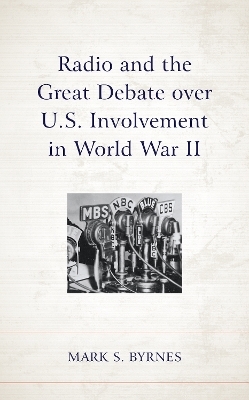
Radio and the Great Debate over U.S. Involvement in World War II
Seiten
2022
Lexington Books (Verlag)
978-1-4985-9855-2 (ISBN)
Lexington Books (Verlag)
978-1-4985-9855-2 (ISBN)
The debate over US involvement in World War II was a turning point in the history of both US foreign policy and radio. In this book the author argues that the debate’s historical significance cannot be fully appreciated unless these stories are understood in relation rather than in isolation.
All the participants in the Great Debate took for granted the importance of radio and made it central to their efforts. While they generally worked within radio’s rules, they also tried to work around or even break those rules, setting the stage for changes that ultimately altered the way media managed American political discourse.
This study breaks with traditional accounts that see radio as an industry biased in favor of interventionism. Rather, radio fully aired the opposing positions in the debate. It nonetheless failed to resolve fully their differences. Despite the initial enthusiasm for radio’s educational potential, participants on both sides came to doubt their conviction that radio could change minds. Radio increasingly became a tool to rally existing supporters more than to recruit new ones. Only events ended the debate over US involvement in World War II. The larger question—of what role the US should play in world affairs—remained.
All the participants in the Great Debate took for granted the importance of radio and made it central to their efforts. While they generally worked within radio’s rules, they also tried to work around or even break those rules, setting the stage for changes that ultimately altered the way media managed American political discourse.
This study breaks with traditional accounts that see radio as an industry biased in favor of interventionism. Rather, radio fully aired the opposing positions in the debate. It nonetheless failed to resolve fully their differences. Despite the initial enthusiasm for radio’s educational potential, participants on both sides came to doubt their conviction that radio could change minds. Radio increasingly became a tool to rally existing supporters more than to recruit new ones. Only events ended the debate over US involvement in World War II. The larger question—of what role the US should play in world affairs—remained.
Mark S. Byrnes is professor in the Department of History at Wofford College.
Chapter 1: “A Democracy of the Air”
Chapter 2: “Getting Away with the Selling of Time”
Chapter 3: “A Program of Radio Education”
Chapter 4: “Radio is the most effective medium for reaching the people”
Chapter 5: “Arsenal of Democracy”?
Chapter 6: “Popular Screen Stars of Hollywood”
Chapter 7: “Some Machinery for Propaganda”
Chapter 8: “Radio: Intervention’s Trump”
Chapter 9: Commentators: “The Public Decides”
Chapter 10: The Great Debate’s Debates
Chapter 11: “The Masquerade is Over”
Chapter 12: “A Moral Force” or “A Gargantuan Jest”?
Chapter 13: “Now the Mask is Off”
| Erscheinungsdatum | 16.11.2022 |
|---|---|
| Verlagsort | Lanham, MD |
| Sprache | englisch |
| Maße | 159 x 235 mm |
| Gewicht | 685 g |
| Themenwelt | Geschichte ► Allgemeine Geschichte ► Neuzeit (bis 1918) |
| Sozialwissenschaften ► Kommunikation / Medien ► Medienwissenschaft | |
| ISBN-10 | 1-4985-9855-2 / 1498598552 |
| ISBN-13 | 978-1-4985-9855-2 / 9781498598552 |
| Zustand | Neuware |
| Haben Sie eine Frage zum Produkt? |
Mehr entdecken
aus dem Bereich
aus dem Bereich
Europa 1848/49 und der Kampf für eine neue Welt
Buch | Hardcover (2023)
DVA (Verlag)
48,00 €
Giordano Bruno - ein ketzerisches Leben
Buch | Hardcover (2024)
C.H.Beck (Verlag)
29,90 €


